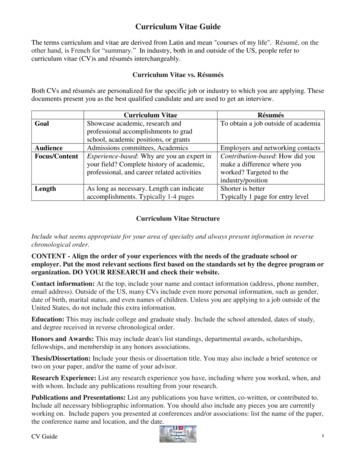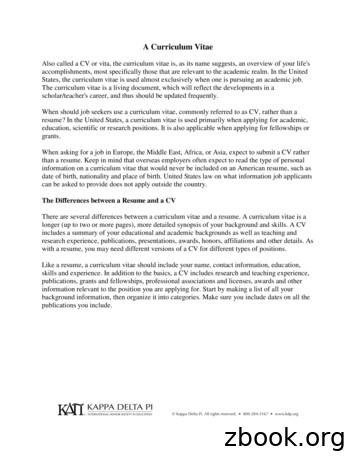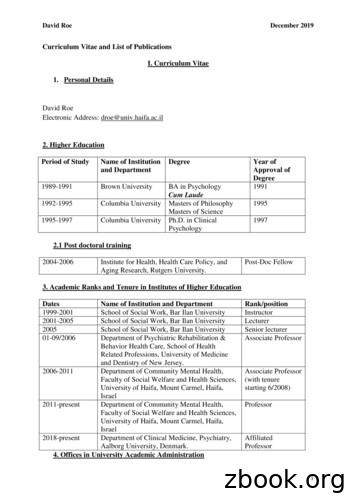Curriculum Vitae Patricia J. Craig, Ph.D., CTRS/L EDUCATION
Curriculum VitaePatricia J. Craig, Ph.D., CTRS/LAssociate ProfessorGraduate Program CoordinatorDepartment of Recreation Management and PolicyCollege of Health and Human ServicesUniversity of New HampshireRoom 101 Hewitt HallDurham, New Hampshire 03824(603) 862-0140 email: pjcraig@unh.eduEDUCATIONPh.D.EducationCognate in College TeachingUniversity of New Hampshire, 2010Durham, New HampshireM.Ed.Sport Management and Leisure StudiesConcentration in Therapeutic RecreationTemple University, 1997Philadelphia, PennsylvaniaB.S.Health and Human ServicesUniversity of Scranton, 1987Scranton, PennsylvaniaPROFESSIONAL 09Associate ProfessorGraduate Program CoordinatorAssistant ProfessorClinical Assistant ProfessorUniversity of New HampshireDepartment of Recreation Management and PolicyDurham, New Hampshire1999-2001Program Specialist, CTRSNortheast Passage,A Program of the University of New HampshireDurham, New Hampshire1994-1999Therapeutic Recreation Sports Specialist, CTRSShepherd CenterTherapeutic Recreation DepartmentAtlanta, Georgia1990-1994Assistant Director, Recreational TherapyCTRS, Spinal Cord Injury UnitCoordinator, Wheelchair Sports ProgramAllied Services Rehabilitation HospitalRecreational Therapy DepartmentScranton, Pennsylvania1987-1989Recreation SpecialistUnited Cerebral Palsy of WestchesterPurchase, New YorkUpdated 10/19/18
PUBLICATIONSPeer-Reviewed Journal Articles** Hawkins, B. L., Craig, P. J., & Anderson, L. (2018). Examining the educational requirements forentry-level RT/TR practice: The process and recommendations of the ATRA Higher EducationTask Force. Therapeutic Recreation Journal/ATRA Annual in Therapeutic Recreation (jointissue), 52(4), 410-418. doi: 10.18666/TRJ-2018-V52-I4-9164.Finn, E.*, Craig, P.J., & Wilder, A. (2018). The meaning of cross-country skiing for persons withsignificant visual impairment: A phenomenological study. Therapeutic Recreation Journal/ATRAAnnual in Therapeutic Recreation (joint issue), 52(4), 349-373.doi: 10.18666/TRJ-2018-V52-I4-9033.Aytur, S., Craig, P. J., Frye, M., Bonica, M., Rainer, S., & McGilvrary, M. (2018). Through the lens of acamera: Exploring the meaning of competitive sport participation among youth athletes withdisabilities. Therapeutic Recreation Journal, 52(2), 95-125. doi: 10.18666/TRJ-2018-V5212-9017.Gillard, A., Hartman, C., & Craig, P. J. (revise & resubmit, Sept. 2018). Fostering adolescent identitydevelopment across the three phases of a structured camp program. Journal of Park & RecreationAdministration.Craig, P. J. (2014). The promise of the internship in the moral development of therapeutic recreationstudents: A research-based case report. ATRA Annual in Therapeutic Recreation, 22, 1-23.Wilder, A., Craig, P. J., & Frye, M. S. (2014). Therapeutic recreation empowering kids (TREK):Exploring best practices in transition. American Journal of Recreation Therapy,13(2),doi: 10.5055/ajrt.2014.0000.Craig, P. J., Wilder, A., Sable, J., & Gravink, J. (2013). Promoting access, transition, and health: Acommunity-based approach to managing chronic health conditions. ATRA Annual in TherapeuticRecreation, 21, 45-62.Craig, P. J., & Oja, S. N. (2013). Moral judgment changes among undergraduates in a capstoneinternship experience. Journal of Moral Education, 42(1), 43-70.Wilder, A., Craig, P. J., Sable, J. R., Gravink, J., Frye, J., & Carr, C. (2011). The PATH-way home:Promoting access, transition, and health for Veterans with disabilities. Therapeutic RecreationJournal. 45(4), 268-285.Craig, P. J., & Sable, J. R. (2011). Applying a constructivist-developmental practice-based learningframework to the recreation internship experience. SCHOLE: A Journal of Leisure Studies andRecreation Education, 26(1), 1-20. 8qzs/fullCraig, P. (2011). The impact of service-learning on college students in allied health professions.ATRA Annual in Therapeutic Recreation, 19, 84-100.Sable, J. R., Craig, P., & Lee, D. (2000). Promoting health and wellness: A research-based case report.Therapeutic Recreation Journal, 34(4), 348-361.(Notes: * denotes graduate student; ** denotes invited peer-reviewed publication)Peer-Reviewed Manuscripts In PreparationAlger, D. M.*, Craig, P. J., Bennett, J., & Martin, T. (in prep, fall 2018). “It Ain’t About the Fishing”:The transformative nature of fly-fishing for veterans and military personnel with PTSD. MilitaryBehavioral Health: An International Journal of Research & Community Study.2Craig vita (continued)
Published Peer-Reviewed Research AbstractsGillard, A., Hartman, C., & Craig, P. J. (2018). “I Am ” Priming the pump for adolescent identitydevelopment. Coalition for Education in the Outdoors, 14th Biennial Research Symposium,January 12-14, 2018, Bradford Woods, IN.Thompson, C., Aytur, S., Bennett, J., Craig, P.J., Wilder, A., & Gravink, J. (2018). The PATH to activeliving: Promoting Access, Transition, and Health for rural veterans in the home/communityenvironment. Active Living Research Conference, February 11-14, Banff, Canada.Hartman, C., Gillard, A., & Craig, P.J. (2017). Significant camp experiences from youth with diversepsychosocial identity statuses. Book of Abstracts (online), National Recreation and ParkResearch Sessions, September 26-28, 2017, New Orleans, LA.Finn, E.*, Craig, P.J., & Wilder, A. (2015). Adaptive snow skiing for persons with visual impairments:Individual meaning and personal hardiness. Research Briefs from the 2015 Research Institute,American Therapeutic Recreation Association Annual Conference, October 1, 2015,Albuquerque, New Mexico.Bennett, J., Trauntvein, N., Craig, P.J., Jeralds, M., & Lee, D. (2015). Constraints to recreationparticipation among Veterans with service-connected disabilities. Research Briefs from the 2015Research Institute, American Therapeutic Recreation Association Annual Conference, October 1,2015, Albuquerque, New Mexico.Craig, P.J., & Sable, J. (2013). The role of the internship in the moral development of TR students.Research Briefs from the 2013 Research Institute, American Therapeutic Recreation AssociationAnnual Conference, October 1, 2013, Pittsburgh, PA.Craig, P. J. (2011). Constraints and resources in the moral development of recreation interns. Book ofAbstracts from the 2011 Leisure Research Symposium, National Recreation and Park AssociationAnnual Conference, November 2, 2011, Atlanta, GA.Craig, P. J., Wilder, A., Sable, J. R., & Gravink, J. (2011). Therapeutic recreation interventions forpersons aging with and into disability: Impact of PATH Program. Research Briefs from the 2011Research Institute, American Therapeutic Recreation Association Annual Conference, September21, 2011, Indianapolis, IN.Craig, P. (2008). Assessing outcomes of service learning on college students in allied health professions.Book of Abstracts from the 2008 American Therapeutic Recreation Association ResearchInstitute, Reno, NV.Research Papers Presented at Professional MeetingsBilynsky, N.*, Craig, P. J., Barcelona, R., Bennett, J., Gravink, J., Chalich, C., & McGilvray, M. (2018).Perceived competencies of adaptive sports professionals: A Delphi study. Disability SportConference September 3-5, 2018, Coventry, UK.Oja, S. N., & Craig, P. J. (2012). How can moral motivation be fostered during internship: Aneducational perspective. Presented in symposium titled: Beyond moral motivation within moralpsychology: Enriching perspectives on how to get motivated to moral action. Association forMoral Education Annual Conference, November 8, 2012, San Antonio, TX.Oja, S. N., & Craig, P. J. (2011). Moral motivation and the role of the internship in professionalpreparation. Association for Moral Education Annual Conference, Oct 2011, Nanjing, China.Craig, P. J., & Oja, S. N. (2011). Moral judgment changes in undergraduates in a capstone internshipexperience. American Educational Research Association Annual Conference, Moral Developmentand Education SIG, April 9, 2011, New Orleans, LA.(Note: * denotes graduate student)3Craig vita (continued)
Research Posters Presented at Professional MeetingsAytur, S., Bennett, J., Greig, A., Thompson, C., Craig, P. J., & Gravink, J. (accepted for posterpresentation Feb 2019). Individual and county-level factors associated with quality of life amongVeterans with disabilities and behavioral health disorders. Active Living Research Conference,February 17-20, 2019, Charleston, S.C.Bennett, J., Thompson, C., Aytur, S., Craig, P. J., & Gravink, J. (2018). Community-based RecreationalTherapy for Veterans with disabilities: Impacts on functioning and quality of life. AmericanTherapeutic Recreation Association Annual Conference, September 15, 2018, Grand Rapids, MI.Aytur, S., Craig, P.J., Frye, M., Bonica, M., Rainer, S.*, Hapke, L.*, & Finn, E.* (2017). Physicalactivity participation at the nexus of social change: Exploring barriers and enablers of active living among persons with disabilities. American Public Health Association Annual Meeting,November 4-8, 2017, Atlanta, GA.Aytur, S., Craig, P.J., Rainer, S.*, Frye, M., Bonica, M., Finn, E.*, Hapke, L.*, Annand, J., & Drum, C.(2017). Physical activity participation at the nexus of social change: Exploring barriers andenablers of active living among persons with disabilities. Active Living Research Conference,February 26-March 1, 2017, Clearwater, FL.(Note: * denotes graduate student)Book Chapters, Invited Publications, Doctoral Dissertation, Master’s ThesisCraig, P. J. (2017). Innovation in fieldwork education: Towards a theoretical framework of fieldworkpedagogy. In N.J. Stumbo, D. DeVries, and B. Wolfe (Eds.), Professional issues in therapeuticrecreation (3rded.) (pp. 461-491). Urbana, IL: Sagamore.Oja, S. N., & Craig, P. J. (2013). Moral motivation and the role of the internship in professionalpreparation programs. In K. Heinrichs, F. Oser, & T. Lovat (Eds.), Handbook of MoralMotivation: Theories, Models, and Applications (pp. 585-606). Rotterdam, Netherlands: SensePublishers.Craig, P. J. (2010). Moving beyond entry-level competencies: The role of the recreation managementinternship in the moral development of college students. Ph.D. dissertation, University of NewHampshire, Durham, NH (Publication No. AAT 3470093).Maurer, C., Floersheim, M., & Craig, P. (1998). Fitness training for a healthy lifestyle: Working withSCI patients to enhance upper extremity strength. Rehab Management, February/March, 36-43.Craig, P. (1997). Psychological and physiological effects of ArcadeAccess on individuals withquadriplegia. Unpublished master’s thesis, Temple University, Philadelphia, PA.Research In ProgressCraig, P.J. (in progress, 2018). The impact of fieldwork experiences on the ethical judgment oftherapeutic recreation students.Madden, K.*, Craig, P. J., Hartman, C., & Gillard, A. (in progress, 2018). Patterns of identity dimensionand meaning making among campers with serious illness.Attisano, E.*, Bennett, J., Craig, P.J, & Trauntvein, N. (in progress, 2018). Constraints and negotiationsto recreation participation among Veterans with disabilities.(Note: * denotes graduate student)4Craig vita (continued)
GRANTSFunded Grants:Barcelona, R., Craig, P.J., Aytur, S., Amato, J., & Frye, M. (March 2018). UNH Sports InclusionMalawi. Sub-award of Indiana University School of Public Health: Youth Enrichment throughSports (YES) Africa Program. U.S. Department of State Bureau of Educational and CulturalAffairs (ECA) - Sports Diplomacy. Durham, NH. Amount Funded: 40,000.Craig, P. (2011). Community Reintegration Program for Individuals with Brain Injury. Campus CompactNH and Danny’s Team Grant. Durham, NH. Award Amount: 500.Grant Proposals – Not Funded:Thompson, C., Bennett, J., Craig, P., & Aytur, S. (April, 2018). Building the base and broadening thereach: Concurrent studies of the PATH (Promoting Access, Transition, and Health) therapisttraining and intervention outcomes in preparation for national influence. Proposal to UNHCollaborative Research Excellence (CoRE) Initiative: Pilot Research Partnership. Durham, NH.Amount Requested: 29,935. Not funded.Craig, P., Aytur, S., Wilder, A., Bennett, J., Sabia, J., McClain, M., Phillips, K., Gravink, J., Thomspon,C., Marchetto, M., Murray, E., & Robey, B. (March, 2017). Promoting access, transition, andhealth for Veterans with pain and comorbid conditions. Submitted to the National Institutes ofHealth, RFA-AT-17-001: NIH-DoD-VA Pain Management Collaboratory Pragmatic ClinicalTrials Demonstration Projects (UG3/UH3). Amount Requested: 4.9 million. Not funded.Craig, P. J., Wilder, A., Sundar, V., Sable, J., & Gravink, J. (March, 2014). Effects of an in-home healthpromotion intervention in the transition of care for persons who have experienced stroke.Concept Paper submitted to Aetna Foundation. Not funded.UNH & CHHS FINANCIAL AWARDS SUPPORTING SCHOLARSHIPUP-2-NIH Grant Training Program (September 2016-May 2017). University of New Hampshire, Officeof the Senior VP for Research. Durham, NH. Award Amount: 12,000.Craig, P. J., & Hapke, L.* (RMP Dept), and Aytur, S., & Rainer, S.* (HMP Dept) (April 2017). UNHCollege of Health and Human Services, Roger A. Ritvo Award. Physical activity participation atthe nexus of social change: Exploring barriers and enablers of active living among persons withdisabilities. Durham, NH. Award Amount: 2,000. This award is based on a collaborative effort between students and faculty on a researchproject. Our interprofessional team comprised faculty and graduate students from theDepartments of Recreation Management and Policy and Health Management and Policy, theUNH Institute on Disability, and staff from Northeast Passage (* graduate students).Craig, P., Aytur, S., Barcelona, B., Frye, M., McGilvrary, M., Jackson, T., & Finn, E. (2015). Throughthe Lens of a Camera: Exploring the Meaning of Competitive Sport Participation Among YouthAthletes with Disabilities. University of New Hampshire, College of Health and Human Services,Research Affinity Group Award. Durham, NH. Award Amount: 5,000.College of Health & Human Services, Center on Aging and Community Living, University of NewHampshire Venture Funds Award. (2012). Impact of PATH on Community-Dwelling Persons Age60 with Primary Diagnosis of CVA. Durham, NH. Award Amount: 2,600.Faculty Scholar, Inaugural Class of Research and Engagement Academy (2011). University of NewHampshire Office of the Senior VP for Engagement and Academic Outreach, Venture FundsAward. Durham, NH. Award Amount: 3,000.Fraas, M., Simmons, D., & Craig, P. (2006). Evaluating a Community-Based Rehabilitation Programfor Adults with Acquired Brain Injury. University of New Hampshire Office of VP for Researchand Public Service Grant, Durham, NH. Award Amount: 13,500.5Craig vita (continued)
PRESENTATIONSPeer-Reviewed National PresentationsHawkins, B, Carter, M., Anderson, L., & Craig, P. Examining the educational requirements for entrylevel RT/TR practice: The process and recommendations of the ATRA Higher Education TaskForce. American Therapeutic Recreation Association Annual Conference, September 14, 2018,Grand Rapids, MI.Hutchins, D., Wyble, R., Craig, P., & Hinton, J. CAAHEP-CARTE Accreditation: A Panel Discussion onOutcomes. American Therapeutic Recreation Association Annual Conference, September 16,2018, Grand Rapids, MI.Craig, P., Nichols, S., Villante, S., Lee, D., & DuPont, R. Competency Based Evaluation of RT InternsUsing a Collaborative Mentoring Approach. American Therapeutic Recreation AssociationAnnual Conference, October 5, 2009, Minneapolis, MN.Craig, P. Assessing Outcomes of Service Learning on College Students in Allied Health Professions.Research Institute of the American Therapeutic Recreation Association Annual Conference,October, 2008, Reno, NV.Sable, J., & Craig, P. The Efficacy of PATH (Promoting Access, Transition and Health): A CommunityBased TR Intervention for People Who Have Recently Experienced a Spinal Cord Injury.American Therapeutic Recreation Association Annual Conference, September, 2003, Atlanta,Georgia.Sable, J., & Craig, P. Project PATH: A Health Promotion Model in the Community, AmericanTherapeutic Recreation Association Annual Conference, September, 2002, Keystone, Colorado.Craig, P., Carr, T., & Lee, D. Trek to Galehead: Abilities Triumph in the White Mountains, AmericanTherapeutic Recreation Association Annual Conference, September, 2001, New Orleans,Louisiana.Craig, P. Psychological and Physiological Effects of ArcadeAccess on Individuals with Quadriplegia,American Therapeutic Recreation Association Annual Conference, September, 1997, Nashville,Tennessee.Craig, P. Impact of Therapeutic Recreation Sports Specialization in the Rehabilitation of Persons withSpinal Cord Injury, American Therapeutic Recreation Association Mid-year Conference, March,1996, Little Rock, Arkansas.Peer Reviewed Regional PresentationsAnderson, L., & Craig, P. Planning the future: ATRA Higher Education Task Force update. New YorkState TR Association Downstate Conference, April 10, 2018, Saratoga Springs, NY.Craig, P. J., Wilder, A., Frye, J., & Carr, C. The PATH-way to Health for Veterans with Disabilities.Massachusetts Recreation and Parks Association Annual State Conference, March 7, 2012,Sturbridge, Massachusetts.Craig, P., Meagher, E., & Colgan, T. Professionalism: It’s a Journey. Keynote Session for the 2nd AnnualConference in Therapeutic Recreation, April 2010, University of Southern Maine, Portland, ME.Craig, P., & Robinson, D. Social Networking: Didn’t Recreational Therapists Invent That?Keynote Session for the New England Therapeutic Recreation Association Annual Conference,October 16, 2009, Sturbridge, MA.6Craig vita (continued)
Peer Reviewed Regional Presentations (continued)Craig, P., Andrus, V., Griffin, V., & Timins, H. Seasoned TR Students for Hire! What Practitioners CanExpect from TR Students with ‘Real World’ Experience. New England Therapeutic RecreationAssociation Annual Conference, November 14, 2008, Durham, NH.Craig, P. Internships in Municipal Recreation: Aligning Student, University, and Agency Expectations.Massachusetts Recreation and Parks Association Annual State Conference, October 22, 2007,Sturbridge, Massachusetts.Craig, P., & DeGrauw, W. From the Classroom to the Community: Assessing Outcomes of ServiceLearning on College Students in Health Professions. New England Therapeutic RecreationAssociation Annual Conference, October 12, 2006, Tyngsboro, MA.Sable, J., & Craig, P. The Efficacy of PATH (Promoting Access, Transition and Health): A CommunityBased TR Intervention for People Who Have Recently Experienced a Spinal Cord Injury. NewEngland Therapeutic Recreation Association Annual Conference, Nov. 2003, Tyngsboro, MA.Craig, P. Clinical Education and the Internship. Presented to the Rehabilitation Staff at New HampshireHospital, October 3, 2002, Concord, New Hampshire.Craig, P. & Carr, T. Trek to Galehead: Abilities Triumph in the White Mountains, New EnglandTherapeutic Recreation Association Annual Conference, November, 2001, Nashua, NH.Craig, P. Project PATH (Promoting Access, Transition, & Health): A Health Promoting Intervention forPeople with SCI, New England TR Association Conference, April, 2000, New Haven, CT.Craig, P., Hufstetler, M., McClure, P., & Survilas, C. The Specialist Program at Shepherd Center: AnOverview of Sports, Outdoors, Horticulture, and Arts Programs, Shepherd Center’s TherapeuticRecreation Conference: Overcoming the Challenge, January, 1998, Atlanta, Georgia.Craig, P., & Rogers, S. Physical Fitness Challenge: Keeping Persons with Spinal Cord Injury PhysicallyFit, Shepherd Center’s TR Conference: Overcoming the Challenge, January1998, Atlanta, GASERVICEUniversity Service, UNH, Durham, NH Mentor, Pathway to Professorship Program, UNH Office of the Senior VP for Research, Fall 2018Planning Committee Member, Discovery Dialogue Event: Darkness and Light: A HumanConversation with Eleven Wo
The promise of the internship in the moral development of therapeutic recreation students: A research-based case report. ATRA Annual in Therapeutic Recreation, 22, 1-23. Wilder, A., Craig, P. J., & Frye, M. S. (2014). Therapeutic recreation empowering kids (TREK): Exploring best practices in transition. American Journal of Recreation Therapy,13(2),
La paroi exerce alors une force ⃗ sur le fluide, telle que : ⃗ J⃗⃗ avec S la surface de la paroi et J⃗⃗ le vecteur unitaire orthogonal à la paroi et dirigé vers l’extérieur. Lorsque la
Curriculum Vitae Guide The terms curriculum and vitae are derived from Latin and mean "courses of my life". Résumé, on the other hand, is French for “summary.” In industry, both in and outside of the US, people refer to curriculum vitae (CV)s and résumés interchangeably. Curriculum Vitae vs. Résumés
CV curriculum vitae CV v. resume – Length – Scholarly/scientific. Curriculum Vitae CV curriculum vitae CV v. resume – Length – Scholarly/scientific – Detailed. Curriculum Vitae (CV) Name, title, curren
A Curriculum Vitae Also called a CV or vita, the curriculum vitae is, as its name suggests, an overview of your life's accomplishments, most specifically those that are relevant to the academic realm. In the United States, the curriculum vitae is used
CRAIG SINGS WITH CRAIG CRAIG DOUGLAS is the latest to try the self -duetting trick on records. His latest, I'm So Glad I Found Her, has Craig singing along with himself a third apart. The disc is on Decca Ritz, coupled with Love Her While She's Young-which Craig des-cribes as: "a pretty ba
3.0 TYPES OF CURRICULUM There are many types of curriculum design, but here we will discuss only the few. Types or patterns are being followed in educational institutions. 1. Subject Centred curriculum 2. Teacher centred curriculum 3. Learner centred curriculum 4. Activity/Experience curriculum 5. Integrated curriculum 6. Core curriculum 7.
1 Curriculum Vitae and List of Publications I. Curriculum Vitae 1. Personal Details David Roe Electronic Address: droe@univ.haifa.ac.il 2. Higher Education Year of Approval of Degree Name of Institution Degree and Department Period of Study BA in Psychology 1991 Cum Laude 1989-1991 Brown University Masters of Philosophy 1995 Masters of Science
The level of management responsible for developing strategic goals is: A. line B. supervisor C. functional D. senior . D. other organisations that do business with the 14 Where a stakeholder is identified as having high interest and low power, an organisation should: keep them satisfied monitor their interests and power C. manage them closely keep them informed 15. Highfield Aeet 12 .























